Inflation rate in
EV increases to 2.5% in April 2020
By
PSA-8
May 12, 2020
TACLOBAN CITY –
Inflation Rate (IR) in Eastern Visayas increased to 2.5 percent in
April 2020. This IR is 0.3 percentage point higher compared with the
2.2 percent IR in March 2020. This is also 0.5 percentage point
higher than the recorded 2.0 percent IR in the same period last
year.
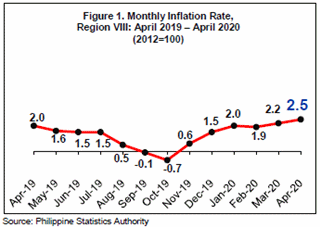 The
regional IR is 0.3 percentage point higher than the 2.2 percent
national average inflation rate in April 2020.
The
regional IR is 0.3 percentage point higher than the 2.2 percent
national average inflation rate in April 2020.
Leyte, Eastern Samar, and
Samar registered lower inflation rates in April 2020 compared with
their figures in March 2020. Leyte recorded the highest decline of
0.8 percentage point. It dropped to 0.8 percent IR in April 2020
from 1.6 percent IR in March 2020. This is the lowest IR among the
provinces during the month in review. On the other hand, IR in
Northern Samar soared to 9.2 percent in April 2020 from 3.5 percent
in March 2020. It accelerated by 5.7 percentage points recording the
highest IR among the provinces during the reference month. Southern
Leyte’s IR rose to 1.6 percent in April 2020 from 1.4 percent in
March 2020. Biliran, meanwhile, retained its previous month’s IR at
1.7 percent.
Of the 11 commodity groups
in the region, five (5) exhibited lower IRs in April 2020 compared
with their rates in March 2020. These were, however, offset by the
higher IRs recorded in other commodity groups; thus, resulting to
0.3 percentage point increase in the overall IR of the region in
April 2020.
Transport commodity group
registered the biggest decline of 5.2 percentage points. It dropped
to 4.3 percent deflation in April 2020 from 0.9 percent IR in March
2020. This can be attributed to the deflations recorded in both
operation of personal transport equipment (17.8 percent) and
transport services (2.1 percent).
Communication commodity
group went down by 2.4 percentage points, from 1.3 percent IR in
March 2020 to 1.1 percent deflation in April 2020. This can be
traced to the 25.2 percent deflation recorded in the index for
telephone and telefax equipment.
The commodity group of
furnishings, household equipment and routine maintenance of the
house eased down by 1.1 percentage points. It dropped to 3.2 percent
in April 2020 from 4.3 percent in March 2020.
Compared with the March
2020 level, the IRs for the commodity groups of alcoholic beverages
and tobacco (8.8 percent); restaurant and miscellaneous goods and
services (4.9 percent); and health (1.1 percent) were lower by 0.3
percentage point and 0.5 percentage point, respectively.
On the other hand, IR of
clothing and footwear commodity group registered the biggest
increase of 2.0 percentage points. Its IR rose to 4.9 percent in
April 2020 from 2.9 percent in March 2020. This increase can be
attributed to the higher inflations recorded in both clothing (4.0
percent) and footwear (6.8 percent) indices in April 2020.
The IR of heavily weighted
food and non-alcoholic beverages commodity group increased by 1.3
percentage points. Its IR went up to 3.1 percent in April 2020 from
1.8 percent IR in March 2020. Higher IRs were noted in majority of
the items under this commodity group. Non-alcoholic beverages index
registered the highest increase of 12.0 percentage points, posting a
double-digit IR of 14.0 percent in April 2020 from 2.0 percent IR in
March 2020. Vegetables index likewise accelerated to 8.3 percent in
April 2020 from 1.5 percent in March 2020. Rice and bread and
cereals indices, meanwhile, continued to register deflations but at
a slower rate of 4.0 percent and 2.5 percent, respectively.
The IR of recreation and
culture commodity group rose to 1.4 percent, higher by 0.5
percentage point compared with its previous month’s IR. While IR for
housing, water, electricity gas and other fuels commodity group was
posted at 1.4 percent, higher by 1.3 percentage points compared with
its March 2020 IR.
Meanwhile, education
commodity group retained its previous month’s IR at 5.3 percent.
The Purchasing Power of
Peso (PPP) of the region was recorded at P0.78 in April 2020. This
is weaker compared with the P0.79 PPP registered in the previous
month. This PPP implies that the goods and services worth P78.00 in
2012 is worth P100.00 in April 2020.
Biliran, Eastern Samar and
Samar posted a P0.01 increase in their PPP compared with their
figures in March 2020. Northern Samar’s PPP, on the other hand,
weakened by P0.04. The rest of the provinces sustained their PPP
last month. Biliran recorded the strongest PPP at P0.82. Leyte and
Southern Leyte ranked second at P0.81, followed by Eastern Samar at
P0.77 and Samar at P0.75. Northern Samar posted the weakest PPP at
P0.69.
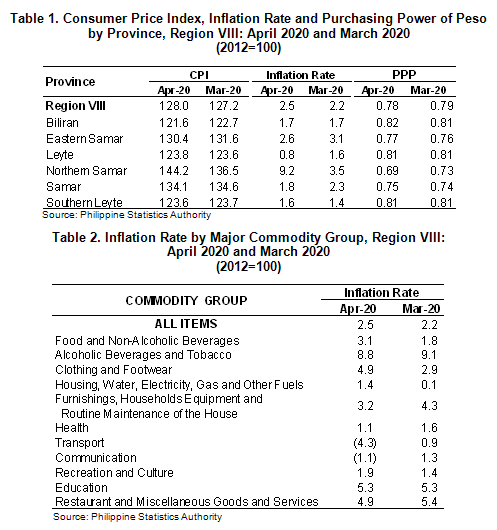
Crackdown amid
lockdown: Duterte fast-tracks Marcosian delusions of fascist
dictatorship with more attacks on press freedom
By
KARAPATAN
May 6, 2020
QUEZON CITY –
Ordering the shutdown of ABS-CBN in the middle of a pandemic is a
blatant attack on press freedom that dangerously infringes on the
people’s right to information, human rights watchdog Karapatan
warned, as the group assailed the National Telecommunications
Commission’s cease-and-desist order against the broadcasting
network.
Karapatan Secretary
General Cristina Palabay condemned ABS-CBN’s closure, stating that
“in the middle of a public heath crisis where the free press plays a
crucial role in keeping the public informed on relevant, verified,
and life-saving information about the COVID-19 pandemic, Duterte and
his minions like Jose Calida are instead fast-tracking his Marcosian
delusions of a fascist dictatorship and brazenly exploiting the
pandemic to impose de facto martial law. They are also ruthlessly
putting thousands of media workers at the risk of losing their jobs
in the face of mass hunger and a looming socioeconomic crisis.”
“Duterte has shown time
and time again his disdain for press freedom and critical voices in
the media and civil society. He and his cabal of sycophants have
repeatedly attacked Rappler, and he even threatened the Philippine
Daily Inquirer that they were forced to sell the broadsheet to one
of Duterte’s cronies. Alternative media outfits and community
journalists also face red-tagging, harassment, death threats, and
even assassinations from the military and other State forces,”
Palabay continued.
She further said that
“since the lockdown began, Duterte has used his emergency powers to
suppress free speech and dissent,” citing the National Bureau of
Investigation Cybercrime Division’s issuance of subpoenas against
individuals allegedly spreading “false information,” the inciting to
sedition charges against public school teacher Juliet Espinosa in
General Santos City, the arrest of writer Maria Victoria Beltran in
Cebu City, and the threats of deportation lodged against
Taiwan-based migrant worker Linn Ordidor – “all for critical social
media posts drawing attention to the government’s incompetence and
inadequate response to the pandemic.”
“ABS-CBN is now the latest
casualty in Duterte’s crackdown on press freedom and freedom of
expression after facing relentless threats from the president
himself. Amid the government’s militarist response to the pandemic,
repeated threats of declaring martial law, the rapid shrinking of
civic spaces in the country, and an intensified crackdown on
dissent, the grave repercussions of the shutdown of the biggest
broadcasting network in the company cannot be ignored or sidelined:
it sends a chilling effect and a stern warning from the State that
expressing dissent will mete out reprisals such as trumped-up
charges, arrests, closure orders, and even death,” she averred.
The Karapatan official
called on the United Nations (UN) Office of the High Commissioner
for Human Rights and other UN independent human rights experts to
look into “this recent attack on press freedom and other abuses of
authority in their report to enable a full-blown independent
investigation on the human rights situation in the Philippines.”
“Karapatan stands in
solidarity with journalists and freedom of expression advocates
against this blatant attack on press freedom. We call on all
freedom-loving Filipinos to stand against the State's attacks on
press freedom and human rights, and to strongly resist and frustrate
the Duterte administration’s nefarious tyrannical schemes to
consolidate power for his fascist rule,” Palabay ended.
|
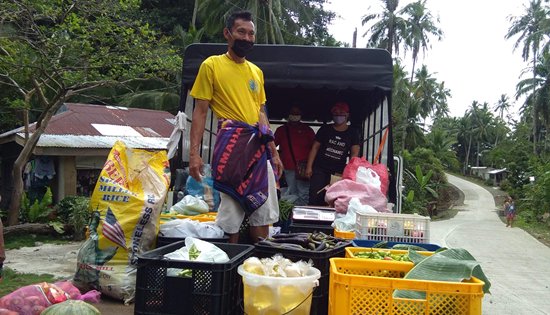
The
Liloan Farmers Agriculture Cooperative in coordination with
the local government unit holds mobile market to sell their
products all over the town. (Photo by Febe Marie Bersabal) |
Agrarian reform
beneficiary organizations generate P22.9M in sales during quarantine
By
JOSE ALSMITH L. SORIA
May 5, 2020
TACLOBAN CITY –
Despite the implementation of community quarantine throughout the
country for several weeks now, 104 agrarian reform beneficiaries
organizations (ARBOs) in Eastern Visayas generated a combined gross
sales of P22,928,460.00.
This period covers from
the last week of March, where most of the local government units
started enforcing their respective community quarantines, up to the
third week of April this year.
Regional Director Stephen
Leonidas of the Department of Agrarian Reform (DAR) was impressed
with the determination of these farmers to survive amid this global
crisis caused by the coronavirus disease 2019 (COVID-19) pandemic.
Members of the said
DAR-assisted farmer organizations continue with their farm
activities and marketing of their harvests despite the current
situation.
As assistance to them
during this hard and trying times, Leonidas disclosed that DAR has
provided 119 ARBOs throughout the region with quarantine
accreditation pass to have access in checkpoints, which was
authorized by the Inter-Agency Task Force for the Management of
Emerging Infectious Disease (IATF-EID), for the continuous supply of
agricultural products.
Leonidas said, these
farmers did not only earn income during the quarantine period but
contributed to the sustainability of food supply in the region.
Based on the DAR
monitoring report, of the 104 ARBOs who continued with their
marketing activities to supply food, 33 are in the province of Leyte;
21 in Eastern Samar; 20 in Samar; 15 in Northern Samar; eight in
Southern Leyte; and seven in Biliran.
Among these ARBOs are the
MAALSADA FISCO based in Alangalang town, and the Paglaum Farmers
Association based in this city.
The MAALSADA FISCO
continued to supply over 6,000 kilos of milled rice to the Eastern
Visayas Medical Center (EVRMC); while the Paglaum Farmers
Association delivered some 3,000 kilos of assorted vegetables to the
Bureau of Jail Management and Penology (BJMP).
Both ARBOs are recipients
of marketing tie-up arrangements facilitated by DAR under the
Enhanced Partnership Against Hunger and Poverty (EPAHP) program.
In Samar, the local
government unit (LGU) of Calbiga purchases all the harvests of the
Calbiga Vegetable Growers Association, Panayuran Upland Farmers
Association, Brgy. Bulao Farmers Association, Canbagtic Farmers
Association, and the Borong Active Farmers Association to give
variation to the canned goods commonly given during distribution of
relief assistance for the town’s residents.
In Southern Leyte, the
Liloan Farmers Agriculture Cooperative conducts a mobile market
around the municipality of Liloan in coordination with the LGU to
sell their products composed of milled-rice and various types of
vegetables harvested under the Linking Smallholder Farmers to the
Market with Microfinance (LinkSFarMM) program. This is to lessen the
movement of people and avoid mass gathering in the market.
Meanwhile, in the province
of Biliran, the BSF Farm Workers and Beneficiaries Agrarian Reform
Cooperative based in Biliran town and the Anislagan Ceramic Agrarian
Reform Cooperative based in the municipality of Naval continue to
supply fresh eggs, from the egg layering livelihood they availed
under the Convergence of Livelihood Assistance for ARBs Project (CLAAP),
to their clients.
In his Facebook comment,
Agrarian Reform Secretary John Castriciones described the farmers as
“silent frontliners” against COVID-19.
DTI assists PPE
producer UNISOL to reinvent its business

By
DTI-ROG
May 5, 2020
MAKATI CITY – As
demand dries up and non-essential establishments temporarily close
amidst the COVID pandemic, the Department of Trade and Industry
(DTI), through its financing arm the Small Business Corporation (SB
Corp.), opens a loan facility for micro, small, and medium
enterprises (MSMEs) that decide to repurpose their production lines
to cope up.
One business that availed
of this DTI facility is Uniform Solutions (UNISOL), a start-up
company for on demand uniforms based in Cebu.
With an initial loan of
P3.0 million approved under DTI's Small and Medium Enterprise -
Personal Protective Equipment (SME-PPE) loan facility, UNISOL was
able to retrofit its production operations to make washable face
masks and reusable protective suits.
CEO Jonas Quilantang
narrated how it took him five years to set-up operations and get
ready for mass production, adopt technological innovations to
improve existing products; have the machines, suppliers as well as
the market ready.
"We wanted to make sure we
can deliver the bulk orders expected of us and sustain our niche
market," Quilantang explained.
UNISOL was about ready to
hold a grand company launch in early 2020 when a dire health
situation developed in China.
Quilantang closely
followed the news on the outbreak, had a hunch that the situation
could worsen and knew a surge in demand for facemasks would follow.
He immediately made a
strategic decision that changed the direction of his company.
"Before Luzon implemented
its enhanced community quarantine (ECQ), I got the commitment from
one of our suppliers for them to provide the needed fabric for the
washable facemasks," he said.
"We started making
washable facemasks mid-March and reusable protective suits in early
April this year," Quilantang added.
Currently, UNISOL
manufactures around 50,000 pieces of washable facemasks per day and
60,000 pieces of reusable protective suits a month.
UNISOL has reached the 1
million mark for facemasks as of April 29 this year.
After a month of
production, Quilantang said that the company now has a stable supply
of the products and is looking to widen its market by forging
partnerships.
UNISOL is one good example
of a company that effectively turned a negative situation into a
good business opportunity, DTI-Regional Operations Group Assistant
Secretary Asteria Caberte said.
Despite the challenges,
the company found a way to repurpose its production operation which
was originally designed to manufacture T-shirts, polo shirts and
jackets to produce personal protective equipment (PPE), and keep its
workers employed, ASec. Caberte explained.
Like UNISOL, SMEs can also
avail of the DTI loan facility by getting in touch with any of the
DTI-Central Visayas provincial offices to signify their interest and
to get an endorsement to the SB Corporation.
Micro enterprises with an
asset size of not more than P3-million can borrow P10,000 to
P200,000 while small enterprises with an asset size of not more than
P10 million can borrow a higher loan amount but not exceeding
P500,000, she said.
|
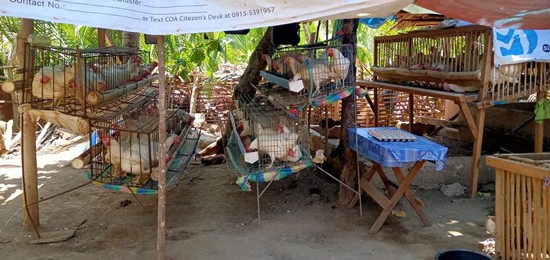
Some
local buyers buy fresh eggs right at the farm of members of
BSF Farm Workers and Beneficiaries Agrarian Reform
Cooperative in Biliran, Biliran who are into egg-layering
business. (Photo courtesy of Maryvic Cempron) |
DAR-assisted
farmer organizations continue to earn amidst quarantine
By
JOSE ALSMITH L. SORIA
May 2, 2020
NAVAL, Biliran – A
famous Filipino saying, “Kapag may itinanim, may aanihin,” may
perfectly apply to some members of agrarian reform beneficiaries
organizations (ARBOs) who nurtured the various assistance extended
to them by the government during the sunny days.
Regional Director Stephen
Leonidas of the Department of Agrarian Reform (DAR) was elated to
know that despite the implementation of the community quarantine as
a precautionary measure to control the spread of the dreaded
coronavirus disease 2019 (COVID-19), several members of the seven
DAR-assisted farmer organizations in this province continue to earn
income from the various livelihood assistance extended to them in
the past by DAR and other government agencies.
Moreover, they contribute
to food sustainability during this hard and trying times.
In a report submitted to
him, disclosed that 31 members of the Anislagan Ceramic Agrarian
Reform Cooperative (ACARCO) from this capital town, as well as 31
members of the BSF Farm Worker’s and Beneficiaries Agrarian Reform
Cooperative from the adjacent Biliran town, continue to supply fresh
eggs in their respective communities.
These 62 ARBO members are
into egg-layering business which they started when they became
recipients of the Convergence of Livelihood Assistance for ARBs
Project (CLAAP) late last year. CLAAP is a joint project of DAR and
the Department of Social Welfare and Development (DSWD) which
provides livelihood assistance to both ARB members of ARBOs and 4Ps
beneficiaries.
In Kawayan town, 44
members of the Ungale Fish Vendors Association continue to earn
income from dried fish processing. These 44 ARBO members were able
to avail of financial assistance from the Land Bank of the
Philippines thru the Agrarian Production Credit Program (APCP) in
2018, which they used as additional capital in sustaining their
business.
In the municipality of
Cabucgayan, the Balaquid Agrarian Reform Cooperative which is into
rice production and trading, continues to supply milled-rice,
contributing to the province’s sufficient supply of staple food.
This cooperative is a recipient of the foreign-assisted Agrarian
Reform Infrastructure Support Project (ARISP).
In Caibiran town, the
Nagkakaisang Magsasaka ng Caibiran (NaMaCa) Multi-Purpose
Cooperative, sell pork from the swine production of the said ARBO.
Meanwhile, 34 ARB members
of the Almeria Seafarers Multi-Purpose Cooperative, and nine ARB
members of the Villa Rice Farmers Producers Association, both from
Almeria town, continue supplying fruits, vegetables and poultry
products to local buyers. The two farmer organizations are
recipients of Linking Smallholder Farmers to the Markets with
Microfinance (LinkSFarMM) program.
From the last week of
March to mid-April this year, the above-mentioned ARBs/ARBOs earned
a combined gross sale of P83,987.
According to Leonidas,
some activities of these farmers can be sustained even amid the
current situation for these are done only in their respective homes,
in their front or backyards.
Further, as assistance for
these farmers to have access in checkpoints while community
quarantine is enforced, Leonidas disclosed that DAR had provided
them with the agency-issued quarantine accreditation pass, which was
authorized by the Inter-Agency Task Force for the Management of
Emerging Infectious Disease (IATF-EID), for the continuous supply of
farm products in town markets, food lanes, and other designated
trading centers.
Fishery
production in Eastern Visayas posts 14.69% increase in the fourth
quarter of 2019
By
PSA-8
May 2, 2020
TACLOBAN CITY –
Eastern Visayas fishery production increased substantially by 14.69
percent in the fourth quarter of 2019. Its production went up to
34,936 metric tons (MT), from 30,461 MT in the same quarter in 2018.
Eastern Visayas ranked
eleventh among regions with high fishery production in the country
in the fourth quarter of 2019. The region contributed 2.73 percent
only to the country’s total fishery production.
Municipal fishery
production (21,834 MT) contributed almost two-thirds or 62.50
percent of the region’s total fishery production. Aquaculture shared
27.78 percent (9,705 MT), while Commercial fishery accounted for
9.72 percent (3,397 MT).
Among provinces, Leyte
recorded the highest volume of fishery production at 12,993 MT in
the fourth quarter of 2019. It supplied 37.19 percent of the total
fishery production in the region. Samar ranked second at 8,037 MT
which accounted for 23.01 percent of the region’s total fish
production. Southern Leyte, meanwhile, had the lowest volume of
production at 1,459 MT. It provided 4.18 percent only of the total
fishery production.
Commercial fishery
production posted the highest increase of 19.44 percent from among
the subsectors of the fishery sector. Its production increased to
3,397 MT in the fourth quarter of 2019 from 2,844 MT in the same
quarter of 2018. Among provinces, Samar registered the highest
volume of production at 1,540 MT. It comprised 45.34 percent of the
total commercial fishery production in Eastern Visayas. Southern
Leyte, meanwhile, registered the lowest volume of production in the
fourth quarter of 2019 at 91 MT. It shared 2.68 percent only of the
total commercial fishery production in the region.
Samar Island (Samar,
Eastern Samar and Northern Samar) topped the municipal fishery
sector in Eastern Visayas in the fourth quarter of 2019. It posted a
67.31 percent combined share to the total municipal fishery (both
marine and inland fishing) production of the region in the said
quarter. Biliran, meanwhile, registered the lowest contribution of
1,321 MT or 6.05 percent share to the regional total.
The region’s total volume
of municipal fishery production (both marine and inland fishing)
registered an increase of 13.84 percent. It rose to 21,834 MT in the
fourth quarter of 2019from 19,179 MT in the same quarter of 2018.
This growth was attributed to the hundredfold increase (112.54
percent) in Leyte Province’s production in the fourth quarter of
2019. This went up to 4,476 MT from 2,106 MT production in the same
quarter of 2018. Biliran, Eastern Samar and Southern Leyte also
posted increases at 43.49 percent, 28.54 percent and 7.22 percent,
respectively. Whereas, Northern Samar went down by 14.60 percent,
while Samar declined by 7.66 percent.
Volume of aquaculture
production recorded a hefty increase of 15.02 percent. It rose to
9,705 MT in the fourth quarter of 2019from 8,437 MTin the same
quarter of 2018. The expansion in aquaculture production in Southern
Leyte (33.98 percent), Samar (30.55 percent) and Leyte (14.22
percent) resulted to the substantial increase in the regional
production. Only Eastern Samar and Northern Samar recorded declines
at 16.87 percent and 6.23 percent, respectively.
Among provinces, Leyte
dominated in aquaculture production. It produced 8,331MT in the
fourth quarter of 2019, comprising 85.84 percent of the total
aquaculture production in the region. Samar ranked second at 1,016
MT, accounting for 10.47 percent share to the region’s total
aquaculture production. Biliran, meanwhile, registered the lowest
contribution with 0.23 percent share or 22 MT during the fourth
quarter of 2019.
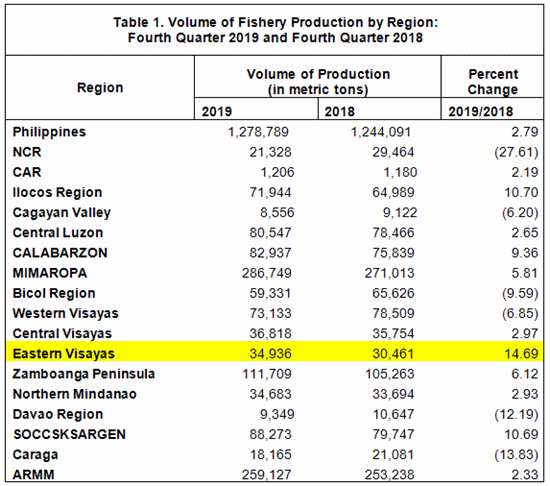
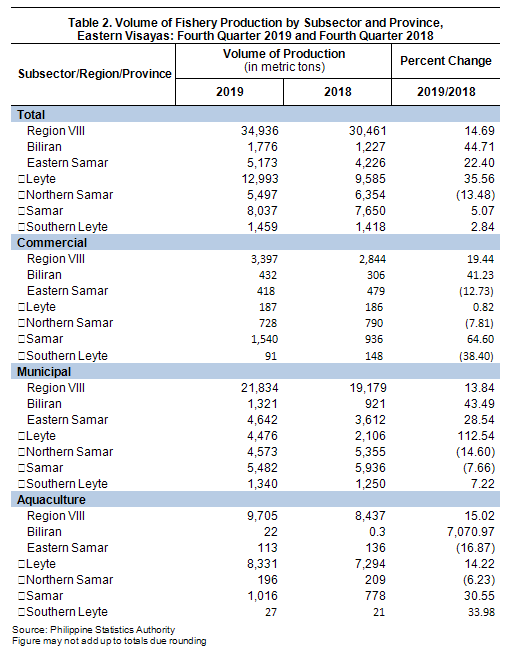
Citizen’s
involvement against CNT’s planned ambush saved lives
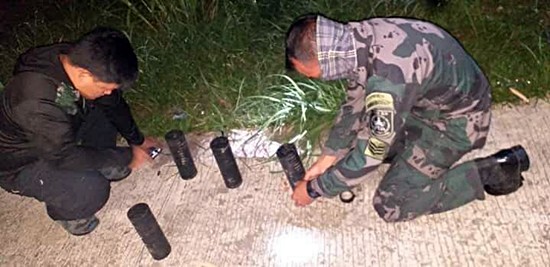
By
DPAO, 8ID PA
May 2, 2020
CAMP LUKBAN, Catbalogan
City – Combined troops of 46th Infantry (Peacemakers) Battalion,
Philippine Army and Explosive Ordnance Division (EOD) of PNP
Pinabacdao, aided by the vigilant populace of Pinabacdao, Samar,
outrightly responded on the attempt of the CPP-NPA Terrorists (CNTs)
improvised explosive device (IED) attack. The plan was reported by a
concerned citizen to the authorities that led to the retrieval of
four IEDs on April 30, 2020 at about 1:00 a.m.
According to the
informant, the IEDs (PVC-type and sealed with electrical tape) were
placed along Maharlika National Highway at the boundary of barangays
Pahug and Madalunot, all in Pinabacdao, Samar.
The said IEDs were brought
to 46IB Headquarters for proper documentation and disposition.
It can be recalled that
the same army unit retrieved four IEDs in the neighboring barangay
of Hubasan, Municipality of Calbiga, Samar last April 6, 2020.
In October 29 last year,
at around 12:30 a.m., two civilian representatives of Toyota company
survived in a CTG’s IED ambush when their driven white Toyota Hi-Lux
was mistaken by the CTG as police patrol car as they were passing
along Maharlika Highway at the boundary of barangays Lale and Pahug
of Pinabacdao Samar.
Moreover, it can be
recalled that on December 19, 2015, government troops and two DSWD
female staff onboard two trucks coming from humanitarian assistance
in Northern Samar during the onslaught of typhoon “Nona” (Melor)
were ambushed by the CPP-NPA in the same boundary of barangays Pahug
and Madalunot, Pinabacdao, Samar.
The 801st Brigade
Commander, Colonel Camilo Z. Ligayo commended the feat of the
security forces and the help provided by the informant. He also
underscored, “Our security forces are always ready to run after the
rebels who take advantage of the vulnerability of the community in
this challenging time brought by COVID-19 pandemic in the region.”
“The continuous support of
the people prevented the IEDs to inflict harm and averted the loss
of lives unlike what happened last December 13, 2019 in Borongan,
Eastern Samar wherein one PNP personnel and three innocent civilians
were killed and 14 were wounded including 2 minors and an infant
caused by CPP-NPA”, Ligayo added.
Instead of
addressing mass poverty and hunger on Labor Day, Duterte unleashes
mass arrests and fascism
By
KARAPATAN
May 1, 2020
QUEZON CITY – Human
rights group Karapatan assailed the “brutality and sheer lack of
compassion” of the Duterte administration as it enforced a “policy
of mass arrests and fascism instead of addressing mass hunger and
the grossly inadequate government response on International Workers’
Day.”
Karapatan Secretary
General Cristina Palabay said at least 76 individuals – a daughter
of a slain aid worker, relief workers, a priest, a lawyer, human
rights workers and women’s rights advocates, student leaders among
them – were illegally arrested today all over the country. “These
arrests unveil in full the anti-worker and anti-poor character of
this regime that serves not the people but only its militarist and
anti-people interests and agenda,” she stated.
“Workers and the poor are
bearing the brunt of the government’s militarized lockdown due to
the loss of their livelihoods and lack of adequate socioeconomic
aid. Instead of heeding the urgent demands of the marginalized, the
Duterte government and its minions in the military and the police
are instead exploiting quarantine measures to harass, vilify, and
rabidly arrest – even kill – activists, especially those conducting
relief operations in communities hard-hit by the crisis,” Palabay
continued.
Before noon, about 42
activists were arrested in Jaro, Iloilo City hours after negotiating
with policemen to allow them to light candles hold an indignation
caravan to condemn and demand justice for the murder of Bayan Muna –
Iloilo City Coordinator Jose Reynaldo “Jory” Porquia, who was
harassed by the police for conducting relief operations in urban
poor communities. Among the 42 arrested include Jory Porquia’s
daughter, Krisma Niña, Iglesia Filipina Independiente priest Marco
Sulayao, human rights lawyer Angelo Karlo Guillen, human rights
workers Jose Ely Garachico and Alma Sumague.
Meanwhile, police also
arrested 10 women’s rights advocates, teachers, and relief
volunteers from Cure COVID and Bayanihang Marikenyo’t Marikenya who
were organizing their community kitchen in Olandes, Brgy. Industrial
Valley Complex in Marikina City. Despite the orders of Marikina City
Mayor Marcelino Teodoro to release the relief volunteers, the police
led by PNP-NCR Chief Debold Sinas are refusing to release them.
Around 14 residents of Brgy. Central, Quezon City and 4 volunteers
from youth relief initiative Tulong Kabataan were also arrested
after organizing a community kitchen for poor residents in the area.
Two transport workers were also arrested in Brgy. San Isidro,
Rodriguez, Rizal for merely holding placards. Four urban poor
residents of Brgy. Paso de Blas, Valenzuela City were brought to the
police station; the police said photos of their protests were seen
on Facebook.
Meanwhile, teachers from
the ACT for People’s Health experienced harassment this morning,
just as they were scheduled to distribute food packs and face masks
to workers in establishments along Visayas Avenue in Quezon City.
Yesterday afternoon, April 30, 16 workers from Coca-Cola in Sta.
Rosa, Laguna were also taken by elements of the Police Regional
Office - 4A and the Philippine Army's 202nd Brigade; today, they
were paraded to the media as “rebel surrenderees.”
The Karapatan official
averred that “contrary to the president’s faux pledge to ‘reaffirm
the government’s commitment to uphold the dignity of labor,’ these
mass arrests, fake surrenders, and harassment of relief volunteers
on Labor Day show the lengths this regime is willing to go to harass
and threaten activists. It simply wants the poor to rot away in
hunger; they cannot claim to uphold the dignity of labor when this
fascist regime has been so eager to please the interests of big
businesses and its bloodthirsty militarist lapdogs at the expense of
people’s rights and welfare.”
“Instead of responding to
the socioeconomic needs of the people, these mass arrests will only
worsen the plight of the poor. Yung tumutulong, ikinukulong. Yung
mga opisyal na lumalabag sa batas, binibigyan ng special treatment.
In the face of State violence and repression and Duterte’s blatantly
anti-poor and anti-worker regime, these arrests should make everyone
realize that it is but just and it is but right to speak out and act
for our people’s rights and wellbeing,” she ended.